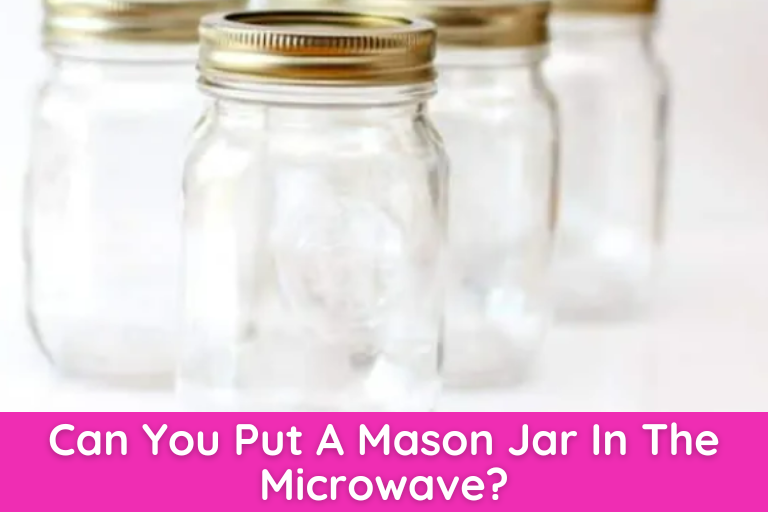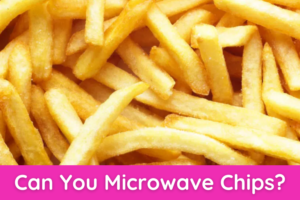When it comes to microwaves, mason jars are tricky. It is important to know that you should not put them directly into the microwave as this could cause damage to your microwave and even injure you.
However, with careful preparation and the right steps, you can use mason jars safely in the microwave!
Can You Put a Mason Jar in the Microwave?
Yes, you can put mason jars in the microwave. However, it is important to ensure the jar is prepared correctly and there are no chips or cracks that could cause it to shatter. Following these simple guidelines can allow you to enjoy all the benefits of a microwavable mason jar!
How long can you microwave a mason jar?
A mason jar can be safely microwaved for up to two minutes. It is important to make sure you are always watching the jar and removing it from the microwave when done. If microwaving for longer, it is best to leave frequent breaks in between so the jar does not overheat and shatter.
How can you tell if a jar is microwave safe?
To tell if a jar is microwave safe, you should look for the words “microwave safe” on the jar itself. If it does not say this, it may be best to avoid microwaving to avoid breakage or injury. Additionally, ceramic and other non-heat-resistant jars should not be microwaved as they can easily shatter.
Are Mason jars oven safe?
Mason jars are oven safe but should be preheated to avoid breakage. Additionally, make sure the lid is not on the jar, and it is placed on an oven-safe surface to prevent melting or cracking.
How do you heat Mason jars?
Heating Mason jars can be placed in a preheated oven or on a stovetop. For ovens, the jar should be placed on an oven-safe surface and put in the preheated oven for about 10 minutes. For stovetops, fill the jar with hot water and place it over medium heat for 5-10 minutes before using it.
At what temperature does a mason jar break?
Mason jars can generally break if exposed to temperatures that exceed 200 degrees Fahrenheit. If a Mason jar is used in an oven, the temperature should not exceed 175-200 degrees Fahrenheit to avoid breakage.
Can you microwave a Mason jar without the lid?
We don’t recommend microwaving a Mason jar without a lid. Without the lid, the jar could warp or shatter due to a pressure buildup. Additionally, Mason jars are not meant to hold liquids while being heated and can explode due to an increase in temperature if heated without the lid.
Can Mason jars handle high heat?
Mason jars can generally handle high heat when used in an oven. However, you should always stay within the recommended temperature of 175-200 degrees Fahrenheit to avoid the risk of breakage.
How long does it take to bake a mason jar?
It typically takes between 20 and 25 minutes to bake a Mason jar. Make sure to keep an eye on the jar while it is baking, as it may require less or more time depending on the thickness of the glass and its contents. Additionally, you should avoid baking jars with lids on them, as this can lead to the breakage of the lid or jar.
Does the heating jar help it open?
Heating a jar can help loosen the seal since heat helps soften adhesives. Fill the jar with boiling water and let it sit for a few minutes before opening it. Then, use care when opening the lid, as the steam may cause it to burst off suddenly.
Do you have to boil mason jars before using them?
Mason jars are designed to be food safe, so it is not necessary to boil them before use. However, for extra assurance and to remove any dust or debris that may have been collected on the jar, you can fill it with boiling water and allow it to sit for a few minutes before adding your ingredients.
Why is it called a mason jar?
Mason jars, also known as Ball jars, were invented by John Landis Mason in 1858. He was granted a patent for a “fruit-preserving jar,” the first of its kind. The distinct threads around the top of the jar and lid allowed for a secure seal when used with sealing wax or a screw-on zinc lid. Thus, they became known as Mason jars and are still used today for canning and preserving food.
How long does food last in mason jars?
The shelf life of food stored in Mason jars for canning and preserving varies depending on the type of food, acidity levels, and how the jars are sealed. Generally, when canned and sealed correctly, most foods will last for at least one to two years. Some foods like jams and jellies, if vacuum-sealed, can last up to 5 years.
Why are mason jars popular?
Mason jars have become popular in recent years due to their versatility and eco-friendly nature. They can be used for canning foods, such as vegetables, fruits, and jams; they’re great for storing leftovers; and can even be used to make unique decorations or gifts. Mason jars are also reusable and recyclable, making them a great choice for reducing waste.
Can you reheat soup in a mason jar?
Yes, soup can be reheated in a Mason jar. To do so safely, ensure the lid is loose, and there is plenty of space for steam to escape. Place the jar in a pot of boiling water and heat gently until the soup reaches the desired temperature. Be sure never to place a hot glass Mason jar directly on any surface, as it may crack or shatter.
Is it safe to bake in mason jar lids?
Yes, it is safe to bake in Mason jar lids. Just be sure to use the flat lid disc and not the outer threaded portion of the lid. These are designed to create a seal between two surfaces and can become bent or misshapen when exposed to heat. The flat disc lids can handle temperatures up to 375 degrees Fahrenheit.
What is the fastest way to sterilize mason jars?
The fastest way to sterilize Mason jars is to submerge them in boiling water for 10 minutes. Place the jars in a large pot with enough water to cover them completely. Bring the water to a full boil and then reduce the heat until a gentle boil is maintained for 10 minutes. Remove from heat, cool, and dry before use.
Conclusion
We hope this article has helped answer your questions about canning with Mason Jars! Have additional questions? Let us know in the comments below to help provide more information on “can you put the mason jar in the microwave.”




